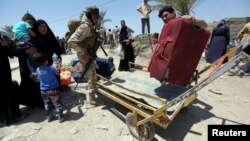Families in Iraq fled from Islamic State fighters on Friday, saying the group had raised its black flag over a regional police headquarters.
In the past two days, IS, also referred to as ISIS and ISIL, has taken over portions of Ramadi, an Iraqi provincial capital, and is reportedly closing in on Palmyra, a Syrian city that holds one of the region’s most important UNESCO World Heritage sites.
On Saturday, the U.S.-led coalition said it had killed a senior Islamic State leader known as Abu Sayyaf and had captured his wife, Umm Sayyaf.
Yan St-Pierre, the CEO of Berlin-based security consulting firm MOSECON, said the announcement was intended to deliver a psychological blow to the Islamic State group to slow its momentum.
“Usually these announcements don’t come within a few hours of the kill being executed," he said. "Rather, maybe a day later. They want to confirm that the target was indeed killed. They want to make sure of it. But over the past 24 hours, past 48 hours, with ISIS making so much progress, it probably added to the pressure of having to act quicker than they wanted.”
Still, he said, the operation was most likely planned well in advance of the most recent IS offensive, and it appears to have been successful from a military standpoint.
In Washington, Defense Secretary Ash Carter said in a statement that the operation represented another significant blow to IS. But St-Pierre said it was not clear how much harm it would cause the Islamic State group. He said Abu Sayyaf was a known jihadi specializing in logistics and finance.
“Any time you hit an organization’s money guys or logistics people, it is a blow," St-Pierre said. "But an organization like ISIS, it's not just one person, like with smaller groups. They usually have contingency plans. There’s always some one ready or willing to take over if something happens. So it is a blow, but not that large of a blow."
Officials said Abu Sayyaf was also involved in managing the Islamic State’s illegal oil trade that once was a significant source of funding for the group.
But from a public relations standpoint, St-Pierre said, the announcement may have disappointed U.S. officials, because Abu Sayyaf was not all that famous. Many Islamic State observers' first reactions when they heard the news, he said, were: “Who is that guy?”









